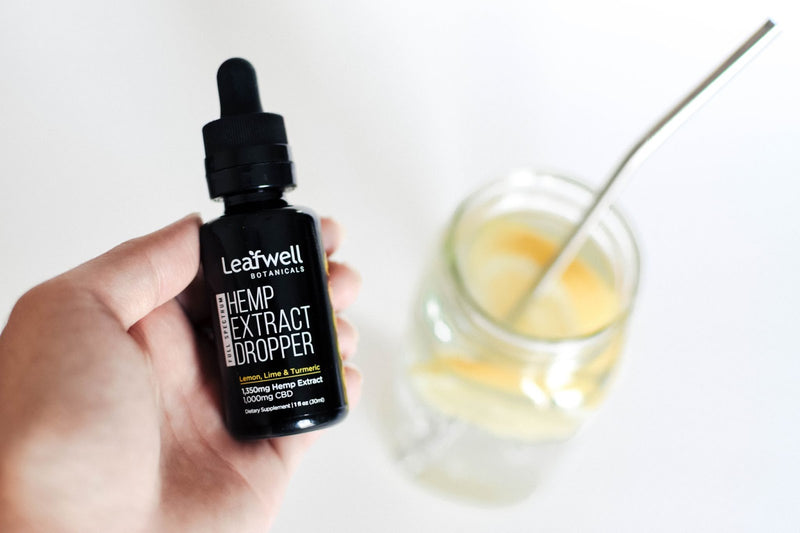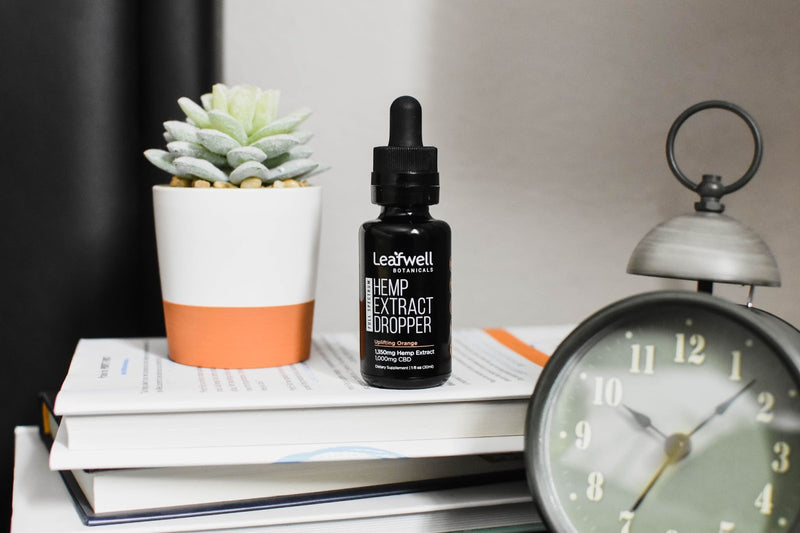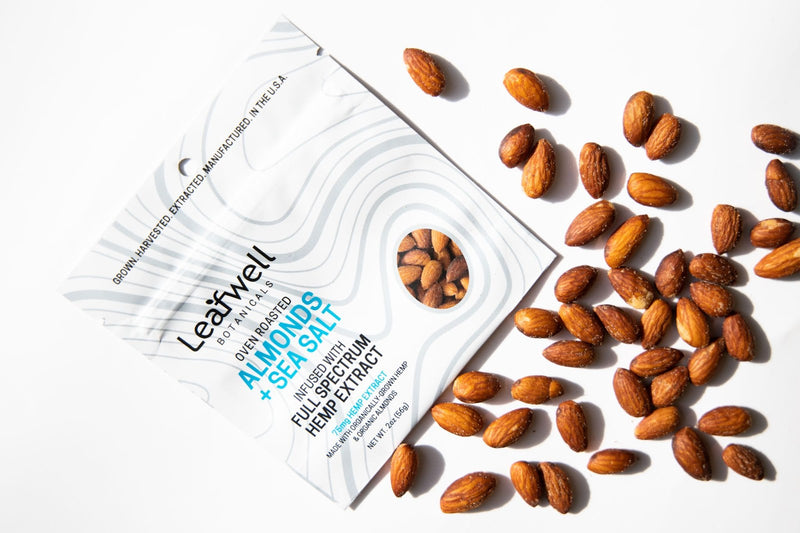Can Dogs Have Almond Butter? Nut Butters Your Dog Can Enjoy

Your dog -- no, all dogs -- deserve the whole world. So, naturally, you want to feed them the tastiest treats you can find. On the other hand, you want to make sure that the snacks you feed your pup are actually safe for them to consume. After all, human foods like grapes and chocolate can be deadly for dogs, and you do not want to make that mistake.
This article will go through all the major types of nut butters, such as almond butter and peanut butter, and determine whether they are safe for your doggo. Later, we will discuss what to watch out for in a nut butter, and how you can use CBD nut butter to support your pup’s health.
Read on for everything you need to know about dogs and nut butters!
Which Nut Butters Can Your Dog Enjoy?
So, you are looking to feed your dog nut butter but aren’t sure which ones are safe and which ones are not. Never fear! We have all the information you need.
First of all, it is important to remember that even the nut butters that are safe for your dog to eat should still be eaten in moderation. Nut butters are high in fat, and too much fat can upset your dog’s stomach and over a long period of time even lead to obesity if used excessively. When it comes to feeding your dog nut butter, a small serving (relative depending on size!) will do the trick every time.
On the other hand, nut butters are a healthier alternative to whole nuts, as they will be less likely to cause obstructions in the digestive tract (which may require surgery!). Dogs may not chew nuts enough, or the nuts may contain hard-to-break-down shells, both of which can irritate your pup’s tummy.
To feed your dog nut butter you can simply add anywhere from a quarter spoon to a spoonful, depending on size, to their meal or mix it in with other treats. Whether the nut butter is part of a (dog-friendly) baked good or spread out on a licking mat, your dog will never be more excited for their daily supplement!
Try feeding them nut butter when you are doing tasks that they don’t like such as clipping toenails or giving baths, so that they become distracted and your pup-related chores are that much easier!
Finally, dogs seem to truly enjoy every food, which can get a little confusing. However, just because your dog likes a particular food, does not mean it is good for them.
The following nut butters are the ones we recommend for sharing with your dog:
1. Peanut Butter: Peanut butter is a true classic, and for good reason! Almost every dog is a sucker for peanut butter, and you can find plenty of dog-friendly peanut butter-flavored treats in the store. Most dogs, however, will be more than satisfied with a spoonful of creamy peanut butter for them to lick. Go for one teaspoon for smaller dogs and one tablespoon for bigger dogs, in terms of average serving size (consult a vet for the most precise recommendation for your pup). Watch out for peanut butters (and other nut butters) with added sugars, stabilizing oils, artificial ingredients, “natural flavors”, etc. which could irritate your dog’s stomach. Also, pups love peanut butter on its own, so we recommend avoiding nut butters with any added sweeteners.
2. Almond Butter: To answer the question in the title -- yes, dogs can eat almond butter. Some dogs do have trouble digesting almond butter though, so if you are going to feed your pup almond butter, start in small amounts and watch them carefully for any symptoms of an upset stomach. Almond butter also tends to be a lot more expensive than peanut butter, so be prepared to have to throw in another $5 bill or two on top of your usual peanut butter budget.
3. Cashew Butter: Just like almond butter and peanut butter, cashew butter is safe for dogs as long as it is eaten in moderation. Raw cashews can be toxic to your pup, so make sure any cashew butter you feed your dog was made from cooked or roasted cashew nuts.
These three nut butters are safe for your dog to eat, as long as you stick to the serving size and avoid brands with added sugars.
One ingredient to look out for above all is xylitol, which is toxic to your dog -- xylitol is a sweetener that some nut butter companies have used in the past. It is very important you double or triple check labels to be sure there is no xylitol in the nut butter.
If you are unsure whether your pup should eat nut butter or are worried about any adverse reactions, talk to your veterinarian.
Finally, if you want to ensure you are feeding your dog the healthiest nut butter possible, without any additives or too much sodium, make sure you look at each brands’ ingredient list.
Which Nut Butters Should Your Dog Avoid?
While peanut butter, almond butter, and cashew butter are all tasty and healthy snack options for your dog, there are a few nut butters that you should keep away from your furry friend at all costs.
These include macadamia and pecan butters:
1. Macadamia Nut Butter: Macadamia nuts are the biggest no-nos for any dog. First of all, macadamia nuts are extra high in fat, so too much of them can cause obesity and even pancreatitis. Macadamia nuts also contain a chemical that is toxic to dogs, and will therefore upset their stomachs. Common symptoms after ingesting macadamia nuts/nut butter include weakness, vomiting, and difficulty walking. As long as your dog has no other health conditions, they should be able to recover from eating macadamia nuts after a day or two.
2. Pecan Butter: Pecans, like macadamia nuts, are also toxic to dogs, due to a compound called juglone which is toxic to dogs. If your dog consumes pecan butter they may experience vomiting, seizures, digestive issues, and even neurological problems. Though you can get away with a very small dose of pecan butter, a large dose can be lethal, so you should keep pecan butter as far away from your pup as possible.
Next, though it may be obvious, any nut butter that was made with chocolate, cocoa, or chocolate-covered nuts should be on your absolutely never list. Seriously, chocolate can be toxic to your dog, and mixing it with a toxic nut butter just multiplies the potential for serious harm.
Remember: the darker the chocolate, the worse it is for your pup, and the more they eat the more likely they will be to experience negative side effects.
If your dog does consume any of the nut butters above and/or starts showing gastrointestinal/neurological symptoms, call your veterinarian immediately.
Additionally, there are some other factors you should consider when it comes to feeding your dog nut butter. Read the ingredients of any jar of nut butter or bag of nut butter treats carefully. Any type of added sugar can upset your dog’s tummy, as can high-sodium (super salty) nut butters. Consequently, you should limit your search to sugar-free and unsalted/lightly salted nut butters.
Be especially wary of the ingredient xylitol we mentioned earlier, which may be present even in nut butters that claim to be sugar-free. Xylitol is a popular sweetener that can cause serious, fatal reactions in dogs. Common symptoms of consuming xylitol include seizures, hypoglycemia, and liver failure. While your dog may need to eat a lot of other ingredients (like pecans) to experience negative side effects, even a small amount of xylitol is enough to trigger dangerous results. Before feeding your dog any treat, look closely for xylitol in the ingredients.
As a rule of thumb, you should stick to nut butters that are marketed specifically towards dogs, and speak with your veterinarian first if you have any concerns. They can scan through the ingredient list themselves for any potentially harmful substances.
Finally, if your dog has any nut allergies you should steer clear of even the healthy nut butters, unless your veterinarian has given you the go-ahead.
In Conclusion: Which Nut Butter is Best For Dogs?
While you should avoid any nut butters that may be toxic to your dog, such as macadamia nut butter or nut butters that contain cocoa or xylitol, there are a couple of nut butters that are safe and even nutritious for your dog when eaten in moderation. These nut butters are peanut butter, almond butter, and cashew butter.
However, which one is the best for your dogs? All in all, you will have the best results with peanut butter. Peanut butter has the highest protein content of any of these nut butters, it doesn’t break the bank, and dogs go crazy for its taste.

Leafwell Botanicals’ very own Creamy Peanut Butter is organic, dog-friendly, and contains added benefits from CBD. Give your pup the treat they deserve with a healthy serving of peanut butter!
Sources
Are Nut Butters Safe for Dogs? | MSAH - Metairie Small Animal Hospital - New Orleans, LA
Can Dogs Taste Almond Butter? - Wag! (wagwalking.com)







